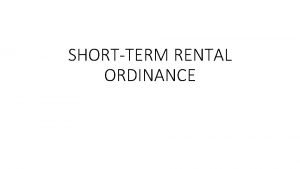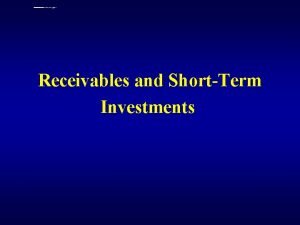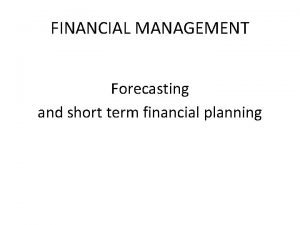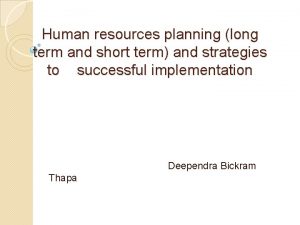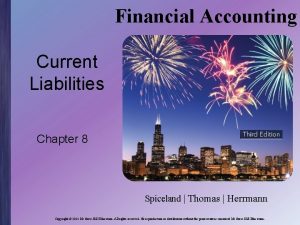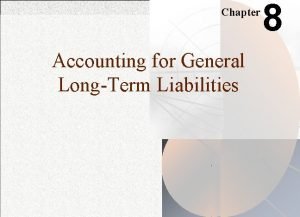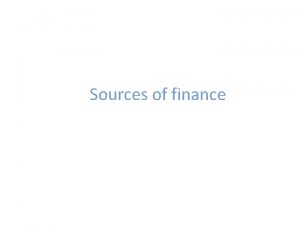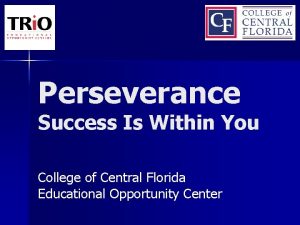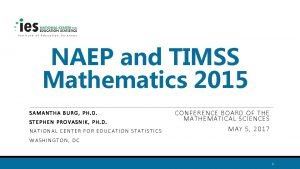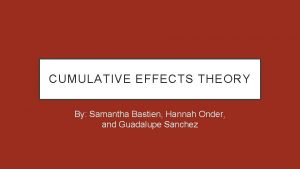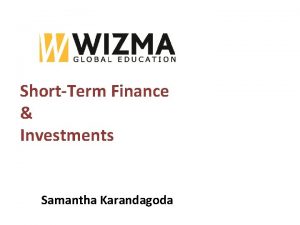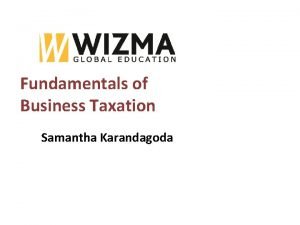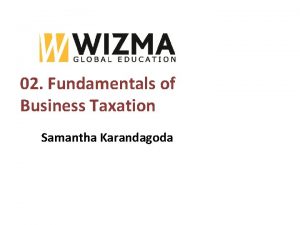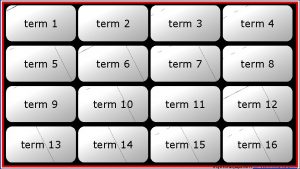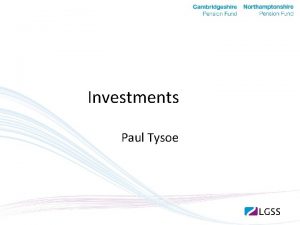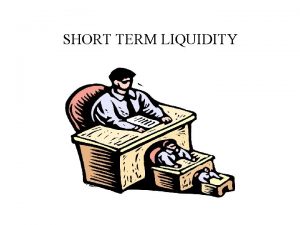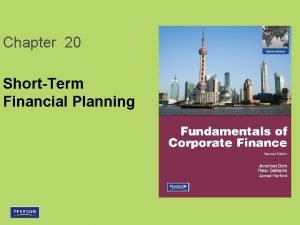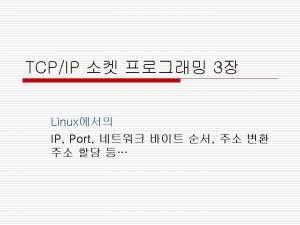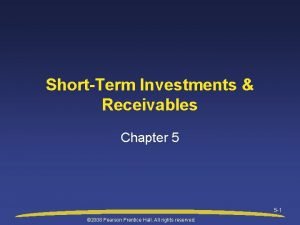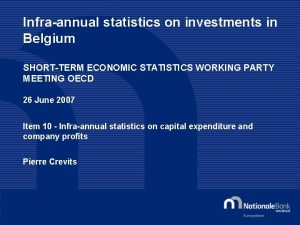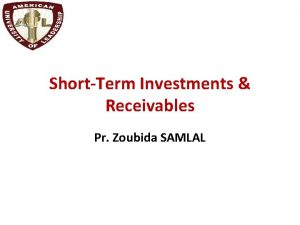ShortTerm Finance Investments Samantha Karandagoda Short Term investments


































- Slides: 34

Short-Term Finance & Investments Samantha Karandagoda

Short Term investments

Short Term Investments • Businesses have Surplus Cash At Certain Times • This is Held Temporarily but Sometimes Remain in the Business for Several Weeks/Months • It can be used to Generate Interest Income

Short Term Investments • Cash Surpluses Can Be Invested in to: –Interest Bearing Bank Accounts –Negotiable Instruments –Short Dated Government Bonds –Other

Investment Criteria • Before Deciding on Whether to Invest or Not As Well as What Kind of Investment is to be Made, following needs to be considered –Maturity –Return –Risk –Liquidity –Diversification

Maturity • Duration within which the Principal Amount will be Returned • Interest Might Be Paid Throughout the Time • Should be within the Time Period that Cash is Available in Excess

Return • With Short Term Investments, Return is the Interest Yield on the Investment • If the Investment is “Redeemable” (capital amt will be repaid to the investor) then the capital repayment will also form part of the return

Risk • Risk is the Possibility of the Investment Falling in Value • Having a Doubt about Eventual Payment of Interest of Repayment of Investment Principal • Higher Risk Investments have Higher Returns • Short term – Easier to Foresee

Risk of Equity (Shares) • Investment in Equity (Shares) is a High Risk • Value of Equity Depends on Future Prospects of the Company • Share Prices Fluctuate based on Several Factors • Not Suitable for Short Term Investments

Liquidity • Liquidity Refers to the Ease of “Cashing In” of a Investment without a Significant Loss of Value of the Asset • Savings Accounts are More Liquid than Fixed Deposits

Diversification • Avoid Putting all Eggs in One Basket • Invest in to a Mix of Different Investment Opportunities • Short Term Investments are Not Required to Diversify as Much as Long Term Investments

Interest bearing accounts

Interest Bearing Accounts • Main Categories: –Bank Deposit Accounts –Money Market Deposits

Deposit Accounts • Some are “Instant Access” Accounts which allow the investor to withdraw money without Notice & without loss of Interest • Best when Need to Earn Interest but Still Needing Instant Liquidity

Deposit Accounts • Some Deposit Accounts do not need notice but there’s a loss of Interest • Some Deposit Accounts Make it Compulsory to Notice before withdrawing Funds

Money Market Deposits • These are Monies Deposited in Money Markets through Banks • Usually the Banks Borrow & Lend Money between them • Some Banks arrange Deposit of Surplus Cash from Customers in the Money Market at Money Market Interest Rates

Money Market Deposits • Can’t Withdraw Until the Deposit Matures • Should be Invested for a Period Less than the Cash Surplus Lasts • Very Short Term (1 day) Deposits Available for Large Amounts of Funds

Effective Annual Interest Yield • Interest on Bank Deposits Accumulates on the Principal Sum Invested • Interest is Added at Regular Intervals e. g. Monthly/Annually • Frequency of Adding Interest Affects the Yield on the Investment

Calculation • Invest 1, 000 for 1 year –At 10% interest, calculated quarterly (2. 5% per quarter) –Total: = [(1+2. 5%)4 -1] x 1, 000 = 1, 103, 813 Interest: 103, 813 P. A. Interest Rate: 10. 38% Better than a Deposit that Calculate Year End 10. 25% Interest!

Interest Earned No. of Days Interest = Amount x Deposited Annualized Interest Rate x No. of Days Interes t Earned Annual Day Count

Negotiable Instruments • Financial Instruments Obtainable as Investments • Title Passes when Handed Over from One Person to Another – Bearer Instruments

Negotiable Instruments • Bank Notes • Bearer Bonds • Certificates of Deposit • Bills of Exchange • Treasury Bills

Certificate of Deposit • A Negotiable Instrument that Provides Evidence of a Short Term Deposit with a Bank for a Fixed Term • Earns a Specific Amount of Interest • Usually the Maturity is 90 days or Less • Amount at Least US$100, 000 or Equivalent

Certificate of Deposit • Holder has the Right to Take the Deposit with Interest • CD Holder can Present the CD to a Recognized Bank at the Maturity to Arrange the withdrawal • Can’t Withdraw Until Maturity • Can be Sold before Maturity

Investment Yield on CD • CSs are Attractive in Money Market since Negotiable • Money Market Deposits Can’t be Withdrawn before Maturity • Therefore the Yields on CDs are Slightly Lower than that of Money Market Deposits

Bills of Exchange

Bills of Exchange • Used for Export Finance as well as for other Purposes • Negotiable Instruments • There’s an Active Market for Bills of Exchange (known as the Discount Market) • Active in Bills of Exchange that are Payable by the Top Quality Banks

Bills of Exchange • A Buyer of a Bill of Exchange Obtains the Right to Receive Payment by the Issuer of the Bill when it Matures • Investors buy at a Discount to Face Value. Hence Bills of Exchanges are a Type of Discount Paper • Investors Prefer Bank Bills (High Credit Rating) Compared

Bills of Exchange • Yields Vary According to the Credit Risk Associated with the Bill • Investors are Willing to Pay More for a Bill Issued by a Bank with Better Credit Score

Treasury bills

Treasury Bills • Treasury Bills are Negotiable Instruments Issued by the Government • Maturity Less than 1 Year; usually 3 months (91 Days) • Government Issues them for Short Term Cash Requirements • Debts of the Government

Treasury Bills • Since Government Backed; Less Risk • Yields are Lesser than Other Short Term Investments • It’s Considered that a Treasury Bill Issued within a Country in Domestic Currency is of Zero Risk

Treasury Bills • Treasury Bills are Redeemable at Face Value • Since the Bills are Redeemable at Par, the Investors Pay Less than the Face Value to Buy them • A Type of a Discount Paper • Attractive Because of Low Risk Even Though Yield is Less

Short-Term Finance & Investments Samantha Karandagoda
 Short short short long long long short short short
Short short short long long long short short short Memory devices meaning
Memory devices meaning Shortterm housing
Shortterm housing Accounting for short term investments
Accounting for short term investments Short term finance sources
Short term finance sources Research paper on financial planning and forecasting
Research paper on financial planning and forecasting Short, medium and long term planning in education
Short, medium and long term planning in education Long term memory vs short term memory
Long term memory vs short term memory Short term human resources
Short term human resources Difference between long term and short term liabilities
Difference between long term and short term liabilities Long term liabilities
Long term liabilities Long term goals examples
Long term goals examples Advantages of retained earnings
Advantages of retained earnings Samantha zammit
Samantha zammit Samantha halpern
Samantha halpern Samantha latorres
Samantha latorres Samantha boland
Samantha boland Samantha riou
Samantha riou Samantha caldone
Samantha caldone John towner williams
John towner williams Samantha winslow
Samantha winslow Dr samantha conrad
Dr samantha conrad Samantha marie ide
Samantha marie ide Barbara ruick
Barbara ruick Chicago public schools
Chicago public schools Site:slidetodoc.com
Site:slidetodoc.com Samantha burg
Samantha burg Samantha kepler
Samantha kepler Cumulative effects theory
Cumulative effects theory Samantha hung
Samantha hung Samantha meier
Samantha meier Samantha kieffer
Samantha kieffer Scott formica
Scott formica Samantha haviland
Samantha haviland Samantha figueroa ct
Samantha figueroa ct


